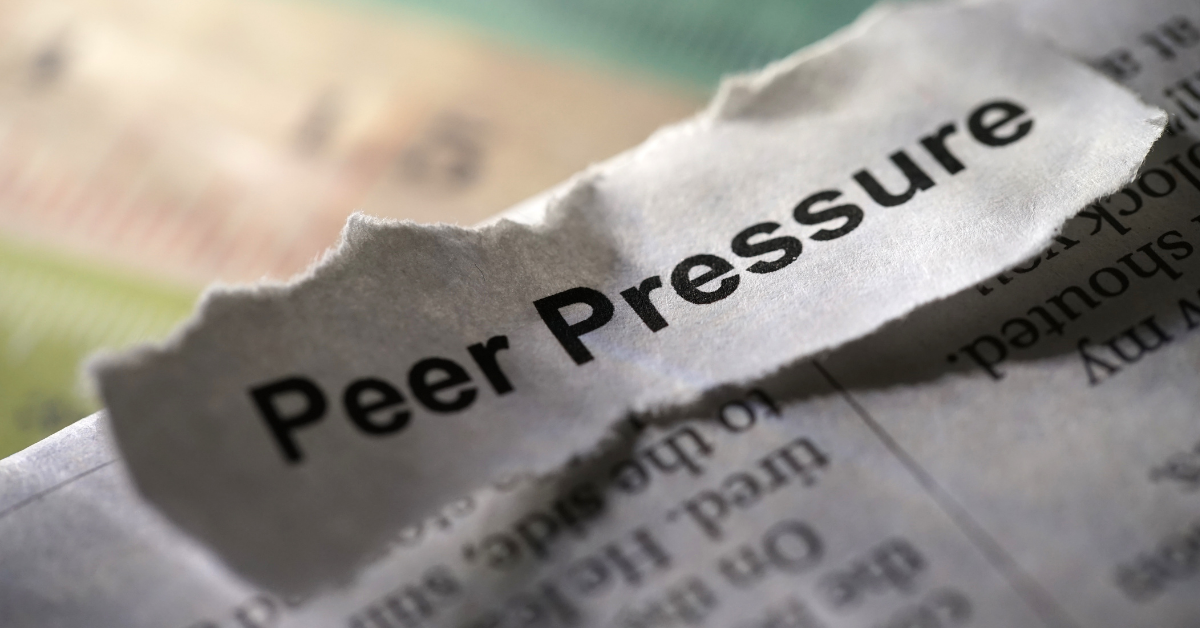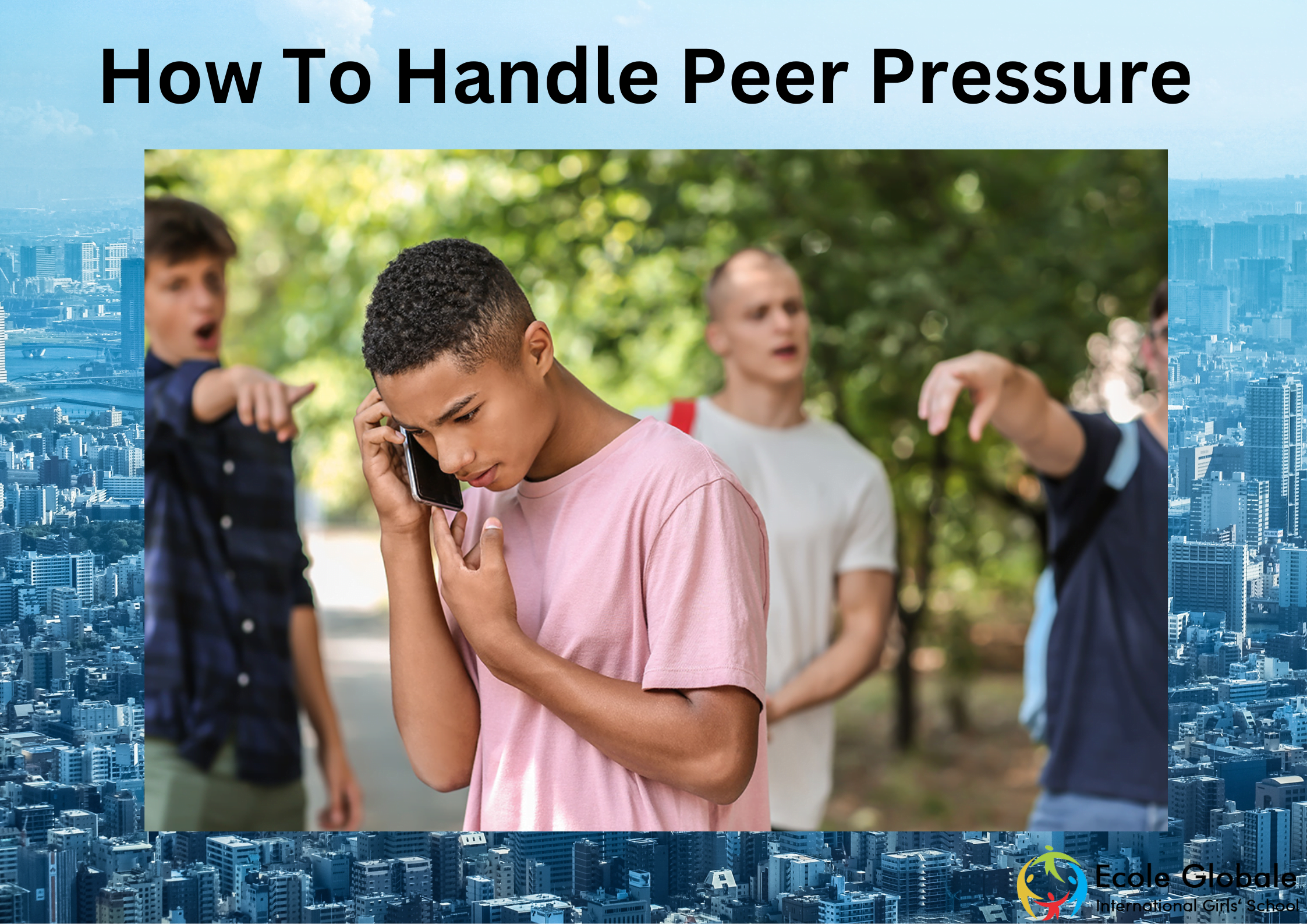Peer pressure can be positive or negative, but it is often harmful. As research conducted by Welham Girls School peer pressure can be either direct or indirect, which means that the person under pressure does not know about it directly (direct), or through the actions of others (indirect).
Both adults, as well as adolescents experience peer pressure. For example, adults face situations where they have to decide whether to take part in something that may seem wrong from an ethical point of view. The same goes for adolescents who are more vulnerable to this influence because they are still developing their personalities and character.
Also Read:Ways To Survive Teen Peer Pressure
Peer Pressure: Definition

Peer pressure is the power members in the same social group hold over one another. It’s also the phrase for the effect of this influence on a person’s need to conform to fit in with the group. Peers are frequently mistaken for buddies. However, they can be anyone with a comparable status, such as those who are the same age, have similar abilities, or have the same social rank.
Peer pressure is generally associated with negative connotations. It’s sometimes used to affect people favourably. Accepted group norms can help one learn how to live with others.
Ways To Handle
Pressure
Have you ever been in a situation where peer pressure was involved? Peer pressure happens all the time, but it’s not something we think that much about. But the fact is, it affects us all, and it can be tricky to deal with it.
Have you ever been working on something, and a friend or family member asks, “Why aren’t you doing that with your life?” Well, you’ll never have to again once you read this handy guide
Identify your limits.
When facing peer pressure, the first thing to do is identify your limits.
If you feel like you’re being pushed into something you don’t want to do, it’s essential to stand your ground and stick to your guns. You don’t have to be rude or mean, but you shouldn’t be afraid to speak up for yourself. If someone pushes too hard, tell them: “I’m sorry, but I don’t feel comfortable doing that.”
Another way to handle peer pressure is simply standing back and observing what’s happening around you. Don’t get involved unless they ask for help! If you feel like your friends are going off track or making bad choices, try stepping back from the situation and letting them figure things out independently.
Practice saying no.
One of the best ways to handle peer pressure is to practice saying no.
If someone asks you to do something that makes you uncomfortable, or if they ask you to do something that could get you into trouble, just say no. It’s that simple!
We all have to say no sometimes. Even if it’s hard, it’s a skill, just like any other skill, and the more you practice saying no, the easier it gets—and the less painful it is for everyone involved. It’s true!
So here are some tips for practising saying no:
1) Use “I” statements instead of “you” statements.
2) Be prepared with an answer to the question, “Why?”
3) Be assertive and respectful.
Your friends may not like it at first, but once they see how easy it is for them to get what they want from other people, they’ll ask YOU for things instead.
Recognise the signs of peer pressure.
Peer pressure is something that we all face. It’s hard to resist, especially from people we like and respect. But the best thing you can do is recognise it!
Here are some signs that you might be facing peer pressure:
– You feel guilty if you don’t do what someone else wants.
– Someone has told you that they won’t be your friend if you don’t do something anymore.
– Someone threatens to tell on you or embarrass you in front of others.
– Someone offers money or other rewards for doing something they want you to do.
Surround yourself with friends who support your choices.
The best way to handle peer pressure is to surround yourself with friends who support your choices and encourage you to do whatever makes you happy. If your friends help your decisions, then they won’t be pressuring you to do anything that goes against them.
If you have trouble finding friends like this, it might be a good idea to get involved in an extracurricular activity or club where you can meet new people who share similar interests. This way, if someone tries to pressure you into doing something that goes against your values, there will be other people around who can remind them that it’s not cool to push others around like that.
Don’t let others decide what’s right for you.
It’s easy to get caught up in what other people think of you and how they want you to act.
But the truth is that their opinions are not yours, and their expectations do not dictate your life.
You have to live your own life, making decisions based on what YOU want and need.
Second, remember that it’s okay to ask questions. If someone pressures you into doing something, ask yourself why they feel this way about the situation. Are they doing this because they think it’ll be fun? Or because they believe it’s the right thing for everyone?
There could be reasons why they want you involved in whatever they’re doing that have nothing to do with how much fun it will be or who will benefit from participating—which can help give perspective on whether or not their opinion matters as much as theirs does.
Don’t let peer pressure get in the way of achieving your higher ground!
Conclusion
You can resist peer pressure without feeling ashamed and without giving up your friends
The fact is that peer pressure exists, whether you want to acknowledge it or not. But the good news is that peer pressure can be resisted without feeling ashamed of yourself or without giving up the friends you’ve made. In other words, peer pressure is something to hold in your head when considering a decision.
Using these tactics will help you recognise when your friends and peers are pressuring you, so you can make more informed decisions in the future that may help protect your self-esteem and sense of identity.
For any queries related to parenting, schooling, or any student-related tips, click here to check out our latest blogs









